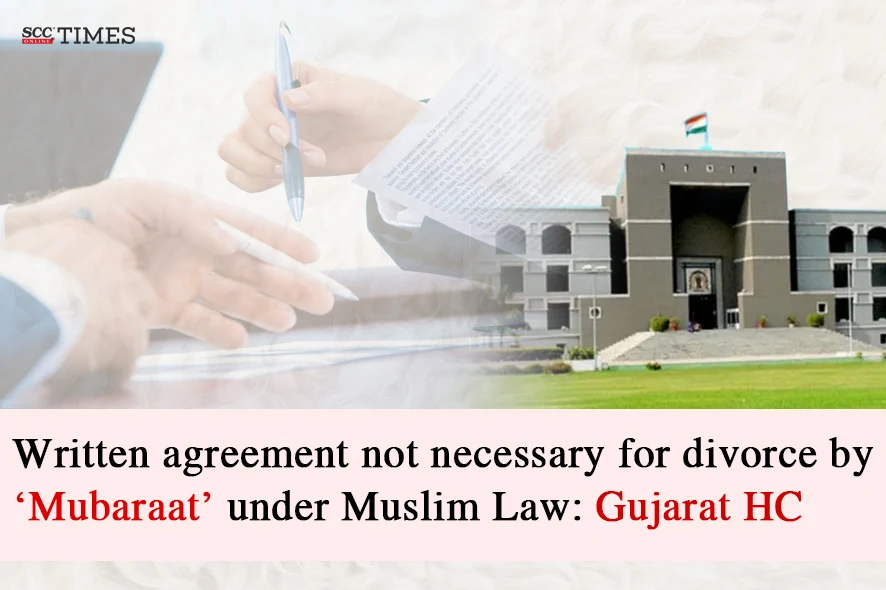Gujarat High Court: In an appeal against the Family Court order dated 19-4-2025, wherein the appellants’ plea for declaration of dissolution of marriage by ‘Mubaraat’ was dismissed, the Division Bench of A.Y. Kogje* and N.S. Sanjay Gowda, JJ, held that an agreement of ‘Mubaraat’ was not required to be in a written format to be considered a valid procedure for divorce by mutual consent.Thus, the Court remanded the case back to Family Court, holding that the Family Court had jurisdiction under Section 7 of the Family Courts Act, 1984 (the Act) to adjudge the suit.
Background
Appellant 1 and 2 were married with 3 children born out of wedlock. Due to constant conflicts, the appellants could not sustain their married life together and had therefore, decided to mutually dissolve their marriage. They had approached the Family Court for declaration of dissolution of marriage by ‘Mubaraat’ under the Muslim Personal Law (Shariat) Application Act, 1937 but the Family Court vide order dated 19-4-2025 had dismissed the suit treating it as not maintainable.
The Family Court had opined that the suit was in the nature of dissolution of marriage which fell squarely within the domain of Muslim Personal Law and the Family Court had no jurisdiction to entertain the same. Furthermore, the Family Court had held that a ‘Mubaraat Agreement’ in a written form was sine qua non for dissolving a Muslim marriage by mutual consent.
Analysis, Law and Decision
The Court in the instant case, referred to various texts and sources of Muslim Law and noted that over 130 verses of Quran support ‘Mubaraat’ as a valid procedure for mutual separation. Thus, the parties are at liberty to agree to mutually dissolve a Muslim marriage when it has come to its end. The Court opined that, based on the several texts analysed by the Court, there was nothing to suggest that a written agreement of ‘Mubaraat’ was necessary for dissolving a marriage or that there was a prevailing practice of maintaining a record register of mutually dissolved Nikkah.
The Court further noted that even though Muslim marriage is generally registered in a register maintained by a local body on the basis of which a Nikahnama is issued, such registration is not mandatory. The Nikahnama so issued is only a declaration of agreement of marriage entered into between parties. The Court held that thus, for dissolution of marriage as well, expression of mutual consent between parties is sufficient and an agreement in a written format is not essential.
The Court further held that the logic given by the Family Court with regard to registering of a Muslim marriage under a register to treat it as a written contract was erroneous since such register and Nikahnama only recognises the agreement entered into by the parties to the marriage and does not make a Nikahnama or registration of a Nikah part of an essential process of Nikah. Similarly, a written agreement is not an essential requirement for dissolution of marriage by ‘Mubaraat’.
Furthermore, the Court opined that suit before the Family Court was for declaration of dissolution of marriage and not for dissolving the marriage per se. As such, Explanation (b) of Section 7 of the Act, confers jurisdiction upon the Family Court to declare validity of marriage or marital status of a person. Therefore, the Court held that the suit before the Family Court was maintainable as it fell within the confines of Section 7 of the Act.
Accordingly, the Court remanded the matter back to the Family Court to be tried on merits. The Court further directed the Family Court to conclude the proceedings within three months from date of receipt of the instant order.
[X v. Y., 2025 SCC OnLine Guj 3339, decided on 23-7-2025]
Order by: Justice A.Y. Kogje
Advocates who appeared in this case:
For the Appellant: Samrat R. Upadhyay, Advocate.
For the Respondent: Urvashi Purohit, AGP







